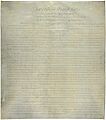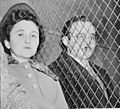Article Three of the United States Constitution facts for kids
Article Three of the United States Constitution sets up the judicial branch of the United States government. This branch includes the courts and judges. Article Three creates the Supreme Court of the United States, which is the highest court. It also allows the United States Congress to create other, less powerful federal courts. This article also explains what kinds of cases these courts can hear.
Contents
Section 1: Federal Courts
The judicial Power of the United States, shall be vested in one supreme Court, and in such inferior Courts as the Congress may from time to time ordain and establish. The Judges, both of the supreme and inferior Courts, shall hold their Offices during good Behavior, and shall, at stated Times, receive for their Services a Compensation which shall not be diminished during their Continuance in Office.
Section 1 of Article Three starts by creating the Supreme Court. This court is the most powerful court in the country. It also gives Congress the power to create "inferior" (less powerful) federal courts.
This section says that judges in these courts will get a regular salary for their work. It also protects judges by saying their salaries cannot be lowered while they are working as federal judges.
Why Judges Keep Their Jobs
Section 1 says that judges "shall hold their Offices [keep their jobs] during good Behavior." This rule is meant to protect federal judges. It also helps make sure that the federal judiciary (the system of courts and judges) is independent.
The complete independence of the courts of justice [is] essential ... [I]ndependence of the judges is equally [needed] to guard the Constitution and the rights of individuals[.]
– Alexander Hamilton
Before America became independent, it was a colony of the British Empire. The Founding Fathers wrote the Constitution after the American Revolutionary War. They remembered how courts worked under British rule. Thomas Jefferson wrote in the Declaration of Independence that Britain's King George III "made judges dependent on his will alone." This meant judges could be fired or not paid if they made decisions the King didn't like.
This system made judges unfair. They would make decisions based on what the King wanted, not what the law said. If judges are not independent, courts cannot be fair, and people cannot get justice.
The Constitution makes sure this doesn't happen to United States federal judges. By saying judges "shall hold their Offices during good Behavior," Section 1 lets judges keep their jobs for life. However, Article Two, Section 4 says that Congress can remove a judge. This can only happen if a judge is found guilty in a trial for "Treason, Bribery, or other High crimes and Misdemeanors." This is what "not good behavior" means. This rule helps judges make fair decisions without worrying about losing their jobs for unpopular choices.
How Many Courts?
Article III clearly says there should be only one Supreme Court. But it doesn't say how many Supreme Court Justices (judges) there should be. Congress decided this in 1948 by passing a law. This law says the Supreme Court will have 9 Justices, including one Chief Justice.
The Constitution gives Congress the right to create courts that are "inferior" (lower) than the Supreme Court. It doesn't say how many lower courts there should be or how they should be set up. Congress makes those decisions. Congress created two main types of lower federal courts:
- "Article III courts" (also called "constitutional courts"): These courts have the main "judicial power."
* The United States Supreme Court * The federal courts of appeals (which hear appeals from lower courts) * The federal district courts (which are trial courts for certain areas) * The United States Court of International Trade
- "Article I courts" (also called "legislative courts"): These courts help Congress with specific powers given in Article One. They also review decisions from government departments. For example:
* The U.S. Tax Court: This court handles disagreements about taxes. * The U.S. Court of Appeals for the Armed Forces: This court hears appeals from military courts. * The U.S. Court of Appeals for Veterans Claims: This court reviews decisions about benefits for veterans. * The U.S. Court of Federal Claims: This court hears cases where people claim the government owes them money.
Section 2: Judicial Power, Jurisdiction, and Trial by Jury
The judicial Power shall extend to all Cases, in Law and Equity, arising under this Constitution, the Laws of the United States, and Treaties made, or which shall be made, under their Authority;—to all Cases affecting Ambassadors, other public Ministers and Consuls;—to all Cases of admiralty and maritime Jurisdiction;—to Controversies to which the United States shall be a Party;—to Controversies between two or more States;—between a State and Citizens of another State;—between Citizens of different States;—between Citizens of the same State claiming Lands under Grants of different States, and between a State, or the Citizens thereof, and foreign States, Citizens or Subjects.
In all Cases affecting Ambassadors, other public Ministers and Consuls, and those in which a State shall be Party, the supreme Court shall have original Jurisdiction. In all the other Cases before mentioned, the supreme Court shall have appellate Jurisdiction, both as to Law and Fact, with such Exceptions, and under such Regulations as the Congress shall make.
Trial of all Crimes, except in Cases of Impeachment, shall be by Jury; and such Trial shall be held in the State where the said Crimes shall have been committed; but when not committed within any State, the Trial shall be at such Place or Places as the Congress may by Law have directed.
Clause 2: Original and Appellate Jurisdiction
When Clause 2 talks about "jurisdiction," it means which court has the power to hear a case.
Original Jurisdiction
"Original jurisdiction" means the power to hear a case first, before any other court. Clause 2 gives the Supreme Court original jurisdiction in:
- Cases involving ambassadors or other diplomats.
- Cases where a state is involved (for example, if a person sues a state government).
- Cases where the United States government itself is involved.
Appellate Jurisdiction
In most other cases, the Supreme Court has "appellate jurisdiction." This means another court hears the case first. If someone disagrees with that court's decision, they can ask the Supreme Court to review the case on appeal. Clause 2 gives the Supreme Court the power to hear appeals on:
- Cases about federal laws, the Constitution, or treaties.
- Cases about things that happened at sea.
- Cases between people who live in different states.
- Cases between people from a state and people from another country.
The Supreme Court can only review a case on appeal if it thinks the lower court's decision might have broken a law or gone against the Constitution.
Jurisdiction Over State Courts
Federal courts generally do not have power over the laws of individual states. They can only review state court decisions if the state decision might have broken a federal law or the Constitution. This means each state's highest court usually has the final say over its own state laws.
Changes to Jurisdiction
In 1795, the Eleventh Amendment changed part of Clause 2. It took away the federal courts' power to hear lawsuits between states and citizens of other states or countries.
In Marbury v. Madison (1803), the Supreme Court decided that Congress cannot change the Supreme Court's original jurisdiction. However, Congress can make rules for the Court's appellate jurisdiction.
Marbury v. Madison also created an important power called judicial review. This is the Supreme Court's ability to check if a law, treaty, or government rule goes against the Constitution. After Marbury, the Supreme Court started watching what the state and federal governments were doing more closely.
Clause 3: Federal Trials
Clause 3 of Section 2 says that federal crimes must be tried in front of a jury. The only exception is an impeachment case, which is tried by the Senate.
This clause also says that a person's trial must be held in the state where they committed the crime. If the crime didn't happen in a specific state, Congress decides where the trial will be.
Several Constitutional Amendments in the Bill of Rights give more details about the rights of people on trial in criminal or civil court.
Section 3: Treason
Treason against the United States, shall consist only in levying War against them, or in adhering to their Enemies, giving them Aid and Comfort. No Person shall be convicted of Treason unless on the Testimony of two Witnesses to the same overt Act, or on Confession in open Court.
The Congress shall have Power to declare the Punishment of Treason, but no Attainder of Treason shall work Corruption of Blood, or Forfeiture except during the Life of the Person attainted.
Clause 1: Definition and Conviction
The last section of Article 3 talks about treason and its punishment. The Founding Fathers wanted to protect Americans' rights. They knew that in England, some kings had gotten rid of their political opponents by simply accusing them of treason. So, the Founders wanted the Constitution to clearly define treason, what was needed to find someone guilty, and what the punishments could be.
The Constitution is very specific about what crimes are treason:
- "Levying [making] War against" the United States;
- "Adhering to [joining or being loyal to]" the United States' enemies; or
- "Giving [enemies] aid and comfort."
Section 3 also makes it clear that treason must be an "overt act." This means a person must actually do something, not just plan it. For example, if a group plans to attack the U.S., it's not treason until they actually attack.
There are only two ways for a person to be found guilty of treason. Two different witnesses must say in court that they saw the person do the "overt act." If there are no two witnesses, the person must admit in court that they committed treason. If neither happens, the person cannot be found guilty.
Clause 2: Punishment
Finally, Section 3 talks about punishment for people found guilty of treason. It gives Congress the power to decide the punishment. However, there is one punishment the Constitution does not allow: punishing a person's family for that person's crime.
In English law, if a person was found guilty of treason, their punishment included "Corruption of Blood." This meant that not only the person, but their family and heirs, would be punished. The person would be executed, and their heirs would lose the right to inherit their land or property.
The end of Section 3 specifically says this punishment is not allowed. When the Founders wrote "no Attainder of Treason shall work Corruption of Blood, or Forfeiture except during the Life of the Person attainted," they meant: "No heirs may be punished, and Congress can make the traitor give up their property, but only during their lifetime." Their heirs must be able to inherit their property after the traitor dies.
Images for kids
-
The Old Royal Exchange in New York City, where the Supreme Court first met in February 1790
-
The Old Supreme Court Chamber in the U.S. Capitol, where the Court met from 1819 until 1860
-
A nineteenth-century painting of a jury.
-
Julius and Ethel Rosenberg, who were executed for treason in 1953 for spying and giving the Soviet Union information about the atomic bomb
-
Secretary of State James Madison, who was involved in Marbury v. Madison
See also
 In Spanish: Artículo III de la Constitución de los Estados Unidos para niños
In Spanish: Artículo III de la Constitución de los Estados Unidos para niños
 | Madam C. J. Walker |
 | Janet Emerson Bashen |
 | Annie Turnbo Malone |
 | Maggie L. Walker |







